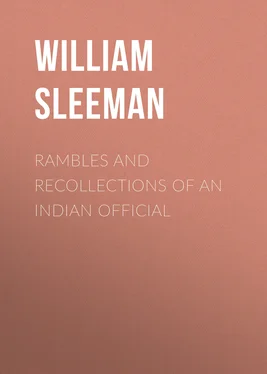William Sleeman - Rambles and Recollections of an Indian Official
Здесь есть возможность читать онлайн «William Sleeman - Rambles and Recollections of an Indian Official» — ознакомительный отрывок электронной книги совершенно бесплатно, а после прочтения отрывка купить полную версию. В некоторых случаях можно слушать аудио, скачать через торрент в формате fb2 и присутствует краткое содержание. Жанр: Путешествия и география, История, foreign_edu, foreign_antique, foreign_prose, на английском языке. Описание произведения, (предисловие) а так же отзывы посетителей доступны на портале библиотеки ЛибКат.
- Название:Rambles and Recollections of an Indian Official
- Автор:
- Жанр:
- Год:неизвестен
- ISBN:нет данных
- Рейтинг книги:4 / 5. Голосов: 1
-
Избранное:Добавить в избранное
- Отзывы:
-
Ваша оценка:
- 80
- 1
- 2
- 3
- 4
- 5
Rambles and Recollections of an Indian Official: краткое содержание, описание и аннотация
Предлагаем к чтению аннотацию, описание, краткое содержание или предисловие (зависит от того, что написал сам автор книги «Rambles and Recollections of an Indian Official»). Если вы не нашли необходимую информацию о книге — напишите в комментариях, мы постараемся отыскать её.
Rambles and Recollections of an Indian Official — читать онлайн ознакомительный отрывок
Ниже представлен текст книги, разбитый по страницам. Система сохранения места последней прочитанной страницы, позволяет с удобством читать онлайн бесплатно книгу «Rambles and Recollections of an Indian Official», без необходимости каждый раз заново искать на чём Вы остановились. Поставьте закладку, и сможете в любой момент перейти на страницу, на которой закончили чтение.
Интервал:
Закладка:
We had occasion to examine a very respectable old gentleman at Damoh upon the case, Gobind Dās, a revenue officer under the former Government, 170 170 Of the Marāthās. The district was ceded in 1818.
and now about seventy years of age. He told us that he had no knowledge whatever of the murder of the eight men at Sujaina; but he well remembered another which took place seven years before the time we mentioned at Abhāna, a stage or two back, on the road to Jubbulpore. Seventeen treasure-bearers lodged in the grove near that town on their way from Jubbulpore to Sāgar. At night they were set upon by a large gang of Thugs, and sixteen of them strangled; but the seventeenth laid hold of the noose before it could be brought to bear upon his throat, pulled down the villain who held it, and made his way good to the town. The Rājā, Dharak Singh, went to the spot with all the followers he could collect; but he found there nothing but the sixteen naked bodies lying in the grove, with their eyes apparently starting out of their sockets. The Thugs had all gone off with the treasure and their clothes, and the Rājā searched for them in vain.
A native commissioned officer of a regiment of native infantry one day told me that, while he was on duty over some Thugs at Lucknow, one of them related with great seeming pleasure the following case, which seemed to him one of the most remarkable that he had heard them speak of during the time they were under his charge.
'A stout Mogul 171 171 More correctly written Mughal. The term is properly applied to Muhammadans of Turk (Mongol) descent. Such persons commonly affix the title Beg to their names, and often prefix the Persian title Mīrzā.
officer of noble bearing and singularly handsome countenance, on his way from the Punjab to Oudh, crossed the Ganges at Garhmuktesar Ghāt, near Meerut, to pass through Murādābād and Bareilly. 172 172 Meerut, the well-known cantonment, in the district of the same name. The name is written Meeruth by the author, and may be also written Mīrath. Ghāt (ghaut) means a ferry, or crossing- place. Murādābād and Bareilly (Barelī) are in Rohilkhand. The latter has a considerable garrison. Both places are large cities, and the head-quarter of districts.
He was mounted on a fine Tūrkī horse, and attended by his "khidmatgār" (butler) and groom. Soon after crossing the river, he fell in with a small party of well-dressed and modest- looking men going the same road. They accosted him in a respectful manner, and attempted to enter into conversation with him. He had heard of Thugs, and told them to be off. They smiled at his idle suspicions, and tried to remove them, but in vain. The Mogul was determined; they saw his nostrils swelling with indignation, took their leave, and followed slowly. The next morning he overtook the same number of men, but of a different appearance, all Musalmāns. They accosted him in the same respectful manner; talked of the danger of the road, and the necessity of their keeping together, and taking advantage of the protection of any mounted gentleman that happened to be going the same way. The Mogul officer said not a word in reply, resolved to have no companions on the road. They persisted—his nostrils began again to swell, and putting his hand to his sword, he bid them all be off, or he would have their heads from their shoulders. He had a bow and quiver full of arrows over his shoulders, 173 173 The bow and quiver are now rarely seen, except, possibly, in remote parts of Rājputāna. A body of archers helped to hold the Shāh Najaf building at Lucknow against Sir Colin Campbell in 1858. Even in 1903-4 some of the Tibetans who resisted the British advance were armed with bows and arrows.
a brace of loaded pistols in his waist-belt, and a sword by his side, and was altogether a very formidable-looking cavalier. In the evening another party that lodged in the same "sarāi" 174 174 An inn of the Oriental pattern, often called caravanserai in books of travel.
became very intimate with the butler and groom. They were going the same road; and, as the Mogul overtook them in the morning, they made their bows respectfully, and began to enter into conversation with their two friends, the groom and butler, who were coming up behind. The Mogul's nostrils began again to swell, and he bid the strangers be off. The groom and butler interceded, for their master was a grave, sedate man, and they wanted companions. All would not do, and the strangers fell in the rear. The next day, when they had got to the middle of an extensive and uninhabited plain, the Mogul in advance, and his two servants a few hundred yards behind, he came up to a party of six poor Musalmāns, sitting weeping by the side of a dead companion. They were soldiers from Lahore, 175 175 Then the capital of Ranjit Singh, the great Sikh chief.
on their way to Lucknow, worn down by fatigue in their anxiety to see their wives and children once more, after a long and painful service. Their companion, the hope and prop of his family, had sunk under the fatigue, and they had made a grave for him; but they were poor unlettered men, and unable to repeat the funeral service from the holy Koran-would his Highness but perform this last office for them, he would, no doubt, find his reward in this world and the next. The Mogul dismounted—the body had been placed in its proper position, with its head towards Mecca. A carpet was spread—the Mogul took off his bow and quiver, then his pistols and sword, and placed them on the ground near the body—called for water, and washed his feet, hands, and face, that he might not pronounce the holy words in an unclean state. He then knelt down and began to repeat the funeral service, in a clear, loud voice. Two of the poor soldiers knelt by him, one on each side in silence. The other four went off a few paces to beg that the butler and groom would not come so near as to interrupt the good Samaritan at his devotions.
'All being ready, one of the four, in a low undertone, gave the "jhirnī" (signal), 176 176 'This is commonly given either by the leader of the gang or the belhā , who has chosen the place for the murder.' It was usually some commonplace order, such as 'Bring the tobacco' ( Ramaseeana , p.99, &c.). See also Meadows Taylor, Confessions of a Thug .
the handkerchiefs were thrown over their necks, and in a few minutes all three—the Mogul and his servants—were dead, and lying in the grave in the usual manner, the head of one at the feet of the one below him. All the parties they had met on the road belonged to a gang of Jamāldehī Thugs, of the kingdom of Oudh. 177 177 The Jamāldehī Thugs resided 'in Oude and some other parts east of the Ganges. They are considered very clever and expert, and more stanch to their oath of secrecy than most other classes' (ibid. p. 97). At the time referred to Oudh was a separate kingdom, which lasted as such until 1856. A map included in the printed Thuggee papers reveals the appalling fact that the Thugs had 274 fixed burying-places for their victims in the area of the small kingdom, about half the size of Ireland.
In despair of being able to win the Mogul's confidence in the usual way, and determined to have the money and jewels, which they knew he carried with him, they had adopted this plan of disarming him; dug the grave by the side of the road, in the open plain, and made a handsome young Musalmān of the party the dead soldier. The Mogul, being a very stout man, died almost without a struggle, as is usually the case with such; and his two servants made no resistance.'
People of great sensibility, with hearts overcharged with sorrow, often appear cold and callous to those who seem to them to feel no interest in their afflictions. An instance of this kind I will here mention; it is one of thousands that I have met with in my Indian rambles. It was mentioned to me one day that an old 'fakīr', 178 178 Fakīr (fakeer), a religious mendicant. The word properly applies to Muhammadans only, but is often laxly used to include Hindoo ascetics.
who lived in a small hut close by a little shrine on the side of the road near the town of Morādābād, had lately lost his son, poisoned by a party of 'daturiās', or professional poisoners, 179 179 So called because the poison they use is made of the seeds of the 'datura' plant (Datura alba ), and other species of the same genus. It is a powerful narcotic.
that now infest every road throughout India. I sent for him, and requested him to tell me his story, as I might perhaps be able to trace the murderers. He did so, and a Persian writer took it down while I listened with all the coldness of a magistrate who wanted merely to learn facts and have nothing whatever to do with feelings. This is his story literally:
Интервал:
Закладка:
Похожие книги на «Rambles and Recollections of an Indian Official»
Представляем Вашему вниманию похожие книги на «Rambles and Recollections of an Indian Official» списком для выбора. Мы отобрали схожую по названию и смыслу литературу в надежде предоставить читателям больше вариантов отыскать новые, интересные, ещё непрочитанные произведения.
Обсуждение, отзывы о книге «Rambles and Recollections of an Indian Official» и просто собственные мнения читателей. Оставьте ваши комментарии, напишите, что Вы думаете о произведении, его смысле или главных героях. Укажите что конкретно понравилось, а что нет, и почему Вы так считаете.












